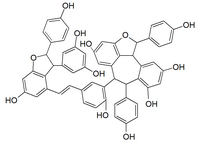Vitisin A is a resveratrol tetramer found in plants of the genus Vitis. It is a complex of two resveratrol dimers, (+)-epsilon-viniferin and ampelopsin B.[2]
 | |
| Names | |
|---|---|
| Preferred IUPAC name
(21S,26R,27S,4E,62S,63S)-27,62-Bis(4-hydroxyphenyl)-21,26,27,211b,62,63-hexahydro-2(1,6)-benzo[6,7]cyclohepta[1,2,3-cd][1]benzofurana-6(4,3)-[1]benzofurana-1,7(1),3(1,3)-tribenzenaheptaphan-4-ene-14,24,28,210,36,66,73,75-octol | |
| Other names
R2-Viniferin[1]
| |
| Identifiers | |
3D model (JSmol)
|
|
| ChEMBL | |
| ChemSpider | |
PubChem CID
|
|
| UNII | |
CompTox Dashboard (EPA)
|
|
| |
| |
| Properties | |
| C56H42O12 | |
| Molar mass | 906.92 g/mol |
Except where otherwise noted, data are given for materials in their standard state (at 25 °C [77 °F], 100 kPa).
| |
It shows an opposite effect to hopeaphenol on apoptosis of myocytes isolated from adult rat heart.[2][3][4]
References
edit- ^ Poster at 1st International Conference of Resveratrol and Health, Jean-Claude Izard, 2010
- ^ a b Seya, K.; Kanemaru, K.; Sugimoto, C.; Suzuki, M.; Takeo, T.; Motomura, S.; Kitahara, H.; Niwa, M.; Oshima, Y.; Furukawa, K. -I. (2008). "Opposite Effects of Two Resveratrol (trans-3,5,4'-Trihydroxystilbene) Tetramers, Vitisin a and Hopeaphenol, on Apoptosis of Myocytes Isolated from Adult Rat Heart". Journal of Pharmacology and Experimental Therapeutics. 328 (1): 90–98. doi:10.1124/jpet.108.143172. PMID 18927354. S2CID 22844861.
- ^ Kim, S. H.; Park, H. S.; Lee, M. S.; Cho, Y. J.; Kim, Y. S.; Hwang, J. T.; Sung, M. J.; Kim, M. S.; Kwon, D. Y. (2008). "Vitisin a inhibits adipocyte differentiation through cell cycle arrest in 3T3-L1 cells". Biochemical and Biophysical Research Communications. 372 (1): 108–113. doi:10.1016/j.bbrc.2008.04.188. PMID 18482581.
- ^ Mi Jeong Sung, S.; Davaatseren, M.; Kim, W.; Sung Kwang, P.; Kim, S. H.; Haeng Jeon, H.; Myung Sunny, K.; Kim, Y. S.; Dae Young, K. (2009). "Vitisin a suppresses LPS-induced NO production by inhibiting ERK, p38, and NF-κB activation in RAW 264.7 cells". International Immunopharmacology. 9 (3): 319–323. doi:10.1016/j.intimp.2008.12.005. PMID 19135555. INIST 21253190.
External links
edit